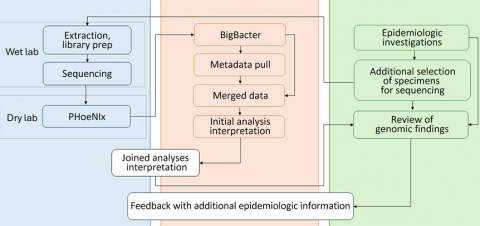Abstract
Mitigating antimicrobial resistance (AMR) is a public health priority to preserve antimicrobial treatment options. The Washington State Department of Health in Washington, USA, piloted a process to leverage longitudinal genomic surveillance on the basis of whole-genome sequencing (WGS) and a genomics-first cluster definition to enhance AMR surveillance. Here, we outline the approach to collaborative surveillance and describe the pilot using 6 carbapenemase-producing organism outbreaks of 3 species: Pseudomonas aeruginosa, Acinetobacter baumannii, and Klebsiella pneumoniae. We also highlight how we applied the approach to an emerging outbreak. We found that genomic and epidemiologic data define highly congruent outbreaks. By layering genomic and epidemiologic data, we refined linkage hypotheses and addressed gaps in traditional epidemiologic surveillance. With the accessibility of WGS, public health agencies must leverage new approaches to modernize surveillance for communicable diseases.
